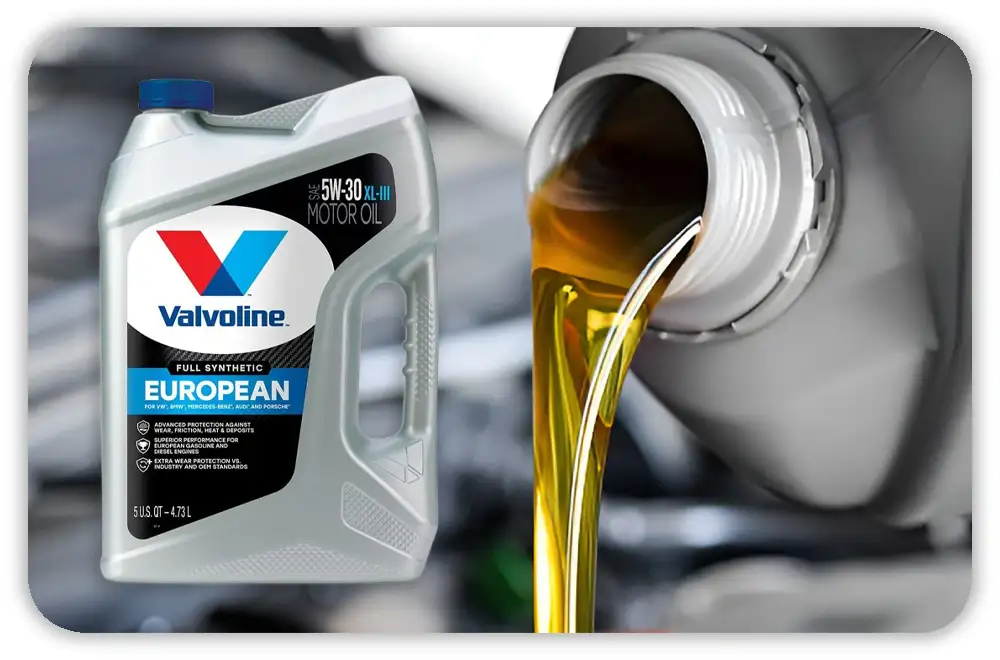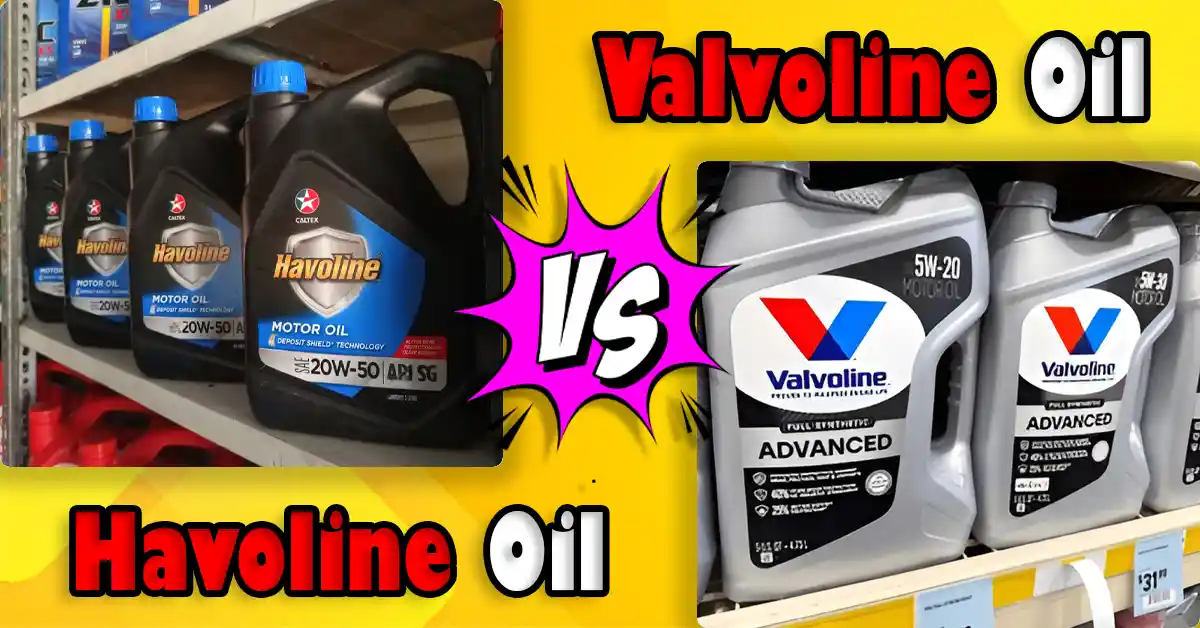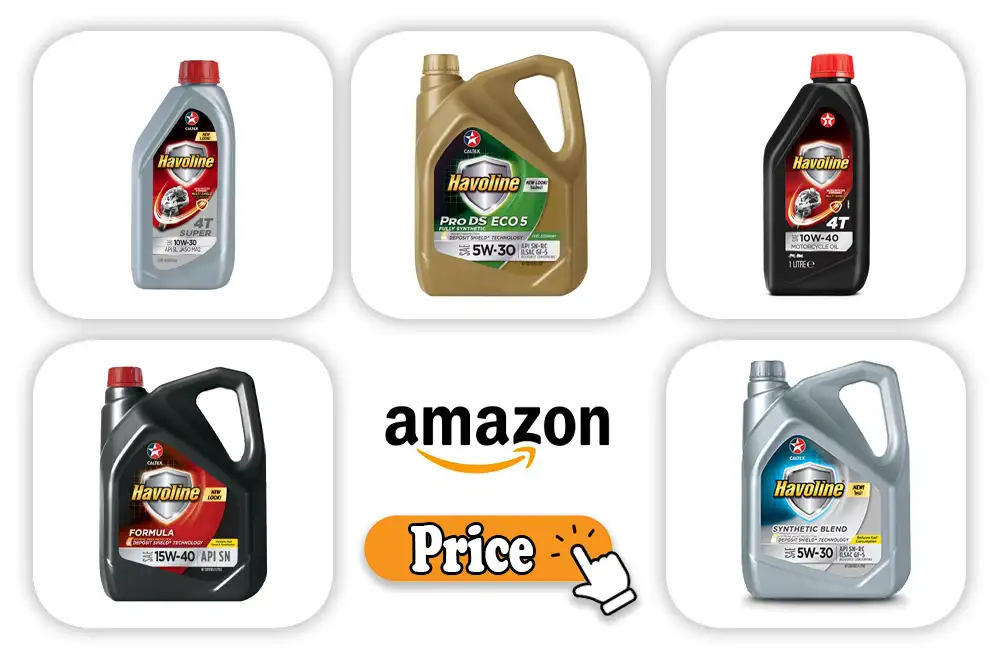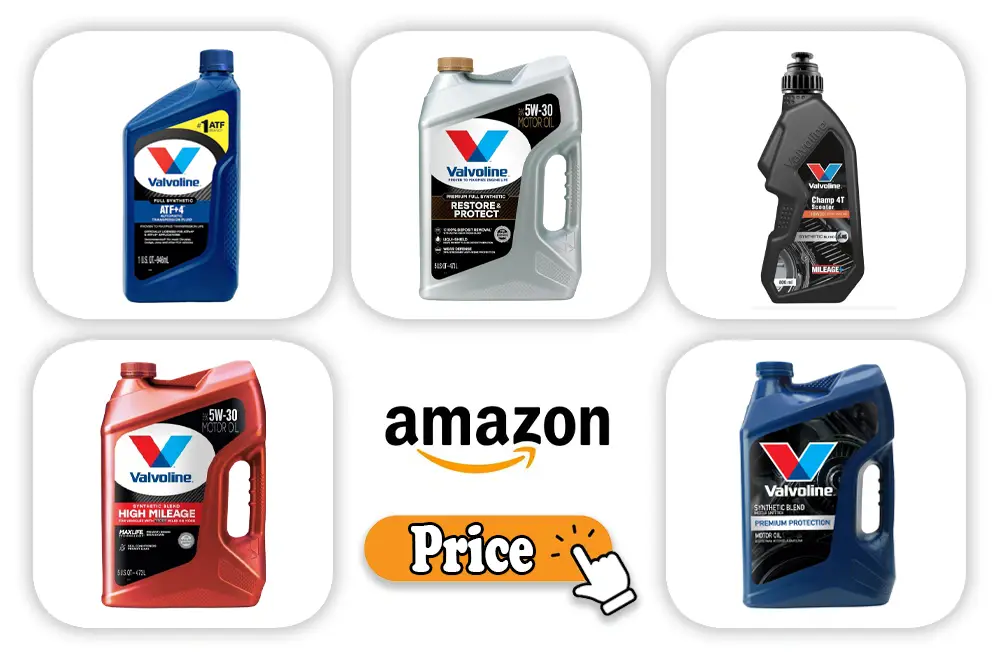Picking the right engine oil matters, especially with the rough driving conditions in the U.S. From freezing mornings in the Northeast to blazing desert highways, your oil needs to handle it all. I’ve used both Havoline and Valvoline, and each has its perks.
In this Havoline vs Valvoline guide, I’ll compare their engine protection, fuel efficiency, and more. If you drive a Ford, Chevrolet, or Toyota and want the best oil, let’s get started!
Table of Contents
Is Havoline Good Oil?
If you want motor oil that keeps your engine running smoothly without costing a fortune, Havoline is a great choice. I’ve used it in my daily driver and on road trips. No matter where I go, my engine stays quiet and responsive.

One thing I love about Havoline is its variety. It comes in different viscosity grades, like 5W-30 and 10W-40. That means you can choose the right one for your climate. It also meets industry standards like API SP and ILSAC GF-6. This helps prevent wear and improves fuel economy. Plus, Havoline’s Deposit Shield technology fights sludge, keeping your engine clean.
What I Like About Havoline Oil
- Great engine protection – Keeps parts clean and reduces wear.
- Affordable – High quality without the high price.
- Fuel-efficient – Helps save gas, especially in city driving.
- Smooth performance – Engine stays quiet and runs well.
- Works in all weather – Reliable in both summer and winter.
- Easy to find – Sold in auto stores, online, and even some gas stations.
What Could Be Better
- Not for extreme racing – Works well for daily driving, but high-performance engines may need a specialized synthetic.
- Synthetic options cost more – Like most premium oils, full synthetic Havoline is pricier than conventional.
- Limited high-mileage choices – Other brands have more options for older engines.
Recommendation
Havoline is a solid pick for everyday drivers. It works well in gasoline engines, including turbocharged and hybrid models. Whether you’re stuck in traffic or cruising the highway, it keeps your engine protected. If you live in extreme weather, Havoline’s synthetic blends handle both scorching heat and freezing cold.
If you drive a high-performance sports car or have an engine with over 150,000 miles, you might need a different oil. But for most drivers, Havoline is an affordable, dependable choice that keeps engines running strong.
👉🏿👉🏻 Check Latest Price and Offer at Amazon 👈🏻👈🏿
Is Valvoline Good Oil?
Yes! Valvoline is one of the most trusted motor oil brands. It’s used by everyday drivers and professionals alike. Whether you drive a car, truck, or SUV, Valvoline helps keep your engine protected.

I’ve used Valvoline in my sedan and SUV for years. It always keeps my engines running smoothly. One winter, my car started without trouble in freezing weather—thanks to Valvoline’s synthetic blend. On a hot summer road trip, my engine stayed cool, even after hours on the highway.
Valvoline makes different types of oil, including conventional, synthetic blend, and full synthetic. It also comes in many viscosity grades, like 5W-30, 10W-40, and 0W-20. Plus, it meets API SP and ILSAC GF-6 standards, which help prevent wear, sludge, and deposits.
What I Like About Valvoline Oil
- Great engine protection – Reduces wear and extends engine life.
- Ideal for high-mileage vehicles – Helps prevent leaks and oil burn-off.
- Works in extreme weather – Reliable in hot summers and freezing winters.
- Easy to find – Available in auto stores, big retailers, and online.
- Affordable – Offers great protection at a fair price.
- Trusted by mechanics – Used in many professional service centers.
What Could Be Better
- A bit pricier – Full synthetic options cost more than store brands.
- Not for extreme racing – Some high-performance engines need specialized oil.
- Packaging could improve – Some people find the pour spouts tricky.
Recommendation
Valvoline is a solid choice if you want reliable, high-quality oil. It’s great for:
- Daily drivers & commuters – Keeps engines running smoothly.
- High-mileage cars – Helps prevent leaks and wear.
- Extreme weather driving – Works well in hot and cold conditions.
- Turbocharged engines – Synthetic oils offer extra heat protection.
If you drive a race car, you might need something more specialized. But for most people, Valvoline is a smart pick. It keeps your engine in top shape without breaking the bank.
👉🏿👉🏻 Check Latest Price and Offer at Amazon 👈🏻👈🏿
Havoline vs Valvoline: Detailed Comparison
If you’ve ever stood in the auto parts aisle debating between Havoline and Valvoline, you’re not alone. I’ve used both in different conditions, and each has its strengths. Let’s break it down based on real-world experience.
Viscosity: Havoline vs Valvoline
Both oils offer solid viscosity options, but there are key differences. Valvoline flows better in cold starts, while Havoline holds up better in high temperatures.
| Aspect | Havoline | Valvoline |
| Cold Start Flow | Slightly thicker, takes longer to warm up. | Thinner at low temps, good for winter starts. |
| High-Temp Stability | Thins out slightly in prolonged heat. | Maintains viscosity well under heat. |
| Viscosity Options | Fewer choices. | Multiple grades for different engines. |
Rating: Havoline: 7.5/10 | Valvoline: 8.5/10
Oil Type: Havoline vs Valvoline
Both brands offer synthetic, semi-synthetic, and conventional oils, but Valvoline provides more variety for performance vehicles.
| Oil Type | Havoline | Valvoline |
| Synthetic | Performs well but costs more. | Best for performance and turbo engines. |
| Semi-Synthetic | Decent performance at a lower price. | Balanced option for daily drivers. |
| Conventional | Basic protection, not ideal for new cars. | Suitable for older engines. |
Rating: Havoline: 7/10 | Valvoline: 9/10
Additive Quality: Havoline vs Valvoline
Both brands include detergents and anti-wear agents, but Valvoline has a slight edge in engine cleanliness and protection.
| Additive | Havoline | Valvoline |
| Detergents | Good but less effective long-term. | Strong cleaning power, prevents buildup. |
| Anti-Wear Agents | Decent but wears off faster. | Excellent metal protection. |
| Friction Modifiers | Minimal effect on fuel economy. | Reduces drag, improves efficiency. |
Rating: Havoline: 7/10 | Valvoline: 8.5/10
👉🏿👉🏻 Check Latest Price and Offer at Amazon 👈🏻👈🏿
Engine Protection: Havoline vs Valvoline
For stop-and-go traffic and highway driving, Valvoline offers better wear resistance and sludge prevention.
| Protection Area | Havoline | Valvoline |
| Wear Prevention | Decent, but not as long-lasting. | Strong anti-wear additives. |
| Sludge Control | May require more frequent oil changes. | Excellent resistance to deposits. |
| Longevity | Tends to degrade faster. | Lasts longer between changes. |
Rating: Havoline: 7/10 | Valvoline: 8.5/10
Fuel Efficiency Impact: Havoline vs Valvoline
Neither oil dramatically improves MPG, but Valvoline’s friction modifiers provide a slight edge in fuel economy.
| Factor | Havoline | Valvoline |
| MPG Improvement | Minimal effect on fuel savings. | Slight increase in fuel economy. |
| Engine Smoothness | Slightly rougher performance. | Noticeable difference, reduces drag. |
| High-Mileage Benefits | Less effective for aging vehicles. | Helps older engines maintain efficiency. |
Rating: Havoline: 6.5/10 | Valvoline: 8/10
Temperature Performance: Havoline vs Valvoline
Cold-start performance and heat stability differ slightly. Valvoline performs better in winter, while Havoline does well in extreme heat.
| Temperature Condition | Havoline | Valvoline |
| Cold Start | Thicker in winter, slower start. | Flows well in freezing temps. |
| High Heat | Loses viscosity slightly. | Stable in prolonged high temps. |
| Extreme Conditions | Struggles in extreme heat. | Reliable under heavy loads. |
Rating: Havoline: 7/10 | Valvoline: 8.5/10
Longevity: Havoline vs Valvoline
If you want to go longer between oil changes, Valvoline offers better longevity.
| Longevity Factor | Havoline | Valvoline |
| Change Interval | Needs changing sooner. | Lasts longer between changes. |
| High-Mileage Use | Less effective for aging engines. | Good for engines with 75K+ miles. |
| Extended Drain Options | No extended-drain products. | Some long-life formulas available. |
Rating: Havoline: 6.5/10 | Valvoline: 9/10
👉🏿👉🏻 Check Latest Price and Offer at Amazon 👈🏻👈🏿
Final Recommendation: Havoline vs Valvoline
Both oils have their strengths. If you’re looking for a budget-friendly option and don’t mind more frequent oil changes, Havoline is a solid pick. However, if you want better engine protection, longevity, and fuel efficiency, Valvoline is the better choice.
Who Should Choose Havoline?
- Budget-conscious drivers who prefer conventional or semi-synthetic oil.
- Those who don’t mind changing oil more often.
- Owners of older vehicles who need basic protection.
Who Should Choose Valvoline?
- Performance and turbocharged engine owners.
- High-mileage drivers who want extended protection.
- Those driving in extreme cold or heat.
Overall, while Havoline is a decent option, Valvoline wins in most categories, making it the better choice for long-term engine health and efficiency.
FAQs: Havoline vs Valvoline
Which oil is better for high-mileage cars?
Valvoline is the better choice. Its high-mileage formulas have extra detergents and seal conditioners to help older engines last longer. Havoline works too, but you may need to change it more often.
Which oil performs better in extreme weather?
Valvoline flows better in freezing temperatures, making winter starts easier. Havoline holds up well in heat but may thin out faster under extreme conditions.
Which oil provides better fuel efficiency?
Valvoline wins here. It has friction modifiers that reduce engine drag, which can slightly improve gas mileage. Havoline focuses more on wear protection than fuel economy.
Is Havoline or Valvoline better for stop-and-go city driving?
Valvoline is the better option for city traffic. Its strong sludge control helps keep engines clean. Havoline protects well but may need more frequent oil changes in heavy traffic.
Can I switch between Havoline and Valvoline?
Yes! As long as you use the right viscosity and oil type for your vehicle, switching between them won’t harm your engine. Both meet industry standards.




